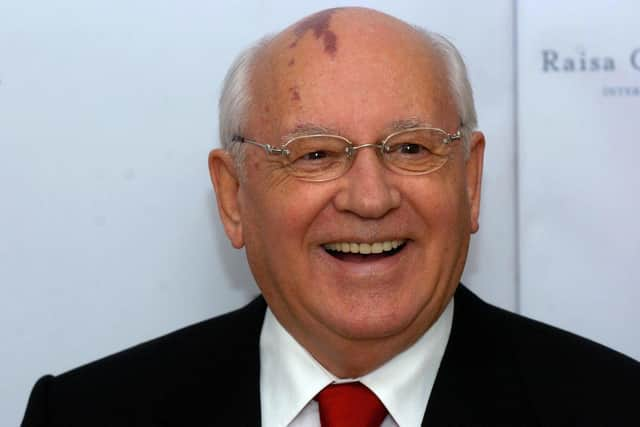How Mikhail Gorbachev's courage brought a peaceful end to the Cold War - Greg Wright
In 1984, the television drama Threads offered an unforgettably nightmarish vision of the carnage a nuclear strike would inflict on Sheffield.
At the time Threads was broadcast, there seemed little hope of a thaw in East-West relations and the lifting of nuclear tensions. Dissent within the Eastern bloc was ruthlessly suppressed and any reformer had good reason to fear the sudden arrival of the Russian military to order them back into line.
Advertisement
Hide AdAdvertisement
Hide AdJust two months after Threads was broadcast, a vigorous and relatively youthful rising star of the Soviet Union bounced into Downing Street and provided a portent of how the world would change. Margaret Thatcher, the arch enemy of communism, famously declared that she could do business with Mikhail Gorbachev.


Gorbachev, who died on Tuesday, undoubtedly ranks among the most influential figures in history. Without him, the world as we know it would simply not exist.
As Soviet leader, Gorbachev’s belief in glasnost and perestroika – openness and restructuring - ended decades of repression.
Gorbachev’s “Sinatra doctrine”, allowing the Communist states of Eastern Europe to do it their way, created a new world order. The knowledge that tanks wouldn’t suppress demonstrators made it much easier to oust discredited governments.
Advertisement
Hide AdAdvertisement
Hide AdHe was not universally loved at home. Many of his countrymen blamed him for the implosion of the Soviet Union and its diminution as a superpower.
The Russian nation that emerged from its Soviet past shrank in size as 15 new nations were created.
Over the last quarter century Vladimir Putin has tried to undo Gorbachev’s legacy, with the war in Ukraine the latest brutal manifestation of this policy.
Eighteen years ago, I gained an insight into Gorbachev’s warmth and humanity, when he shared top billing with Donald Trump in a recorded seminar for Yorkshire business leaders.
Advertisement
Hide AdAdvertisement
Hide AdGorbachev was a child of Communism who, despite his Nobel Peace Prize, personified a regime thrown on the scrap-heap of history. He chose to speak at the event in Atlanta, about the threat to mankind posed by profligacy and terrorism.
Trump, the high priest of the triumphant capitalist system, chose to talk about..err..Donald Trump. In fairness, Trump’s personality displayed softer hues. He spoke movingly about his friendship with the late Superman films star, Christopher Reeve, and the blossoming of a friend who seemed a no-hoper.
Gorbachev, by contrast, was endearingly devoid of slickness. He was en-route to the airport, and had the thankless task of describing global events over the last three decades before his flight appeared on the departure board. It was a bit like asking Stephen Hawking to compress A Brief History of Time into a text message.
No country could assure global security by acting alone, he said.
Advertisement
Hide AdAdvertisement
Hide Ad“The zones of poverty and desperation provide the most fertile grounds for extremism, “ he added. “We know that history is not pre-ordained, there is always the possibility for alternative solutions.”
He acknowledged the Communist system’s flaws: “Life in our country was less decent for human beings than in the West.”
Gorbachev proved that individuals can change the course of history, even if events did not turn out as he intended. It took courage and humility to force a society to confront its failings and allow dissent to flourish when the conventional Soviet response had always been to crush opponents into the ground.
The fact he was respected by Thatcher and Reagan, the Soviet Union’s implacable foes, is a testament to his wisdom and humanity.
Advertisement
Hide AdAdvertisement
Hide AdAbove all, he must be honoured for bringing a peaceful end to the Cold War and reducing the nuclear arsenal. Threads remains a work of fiction and we must thank Gorbachev and Reagan for that. It is tragic that Gorbachev’s open-minded approach has not been displayed by his successors.
As Gorbachev observed in his passionate 1990 Nobel Peace Prize speech: “Peace is not unity in similarity but unity in diversity”.
Comment Guidelines
National World encourages reader discussion on our stories. User feedback, insights and back-and-forth exchanges add a rich layer of context to reporting. Please review our Community Guidelines before commenting.